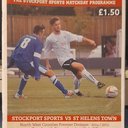FLANAGAN'S FILES
Works Team Helped Make the Game Work
Several professional football clubs in the United Kingdom were formed as works teams, including Manchester United (the team of the Lancashire and Yorkshire Railway depot at Newton Heath), Arsenal (formed as Dial Square in 1886 by workers at the Royal Arsenal in Woolwich), West Ham United (formerly Thames Ironworks), Coventry City, founded by workers of the Singer bicycle company, and the Scottish team Livingston (formerly Ferranti Thistle).
One local club has been in the news recently for non related football issues & that is the club was established in 1923 as a works team of the May & Baker company.
The club became members of the Essex Business Houses League and went on to win the League Cup in 2005–06. The club subsequently joined Division Three of the Essex Olympian League the following season. The club were Division Three runners-up in their first season in the league, and were promoted to Division Two, which was renamed Division One prior to the next season.
The 2007–08 season saw them finish second in Division One, earning promotion to the Premier Division. Despite finishing fifth in the Premier Division the following season, they were demoted back to Division One.
However, the club went on to win the Division One title in 2009–10 and were promoted back to the Premier Division.
In 2014 the club were renamed May and Baker Eastbrook Community, reflecting the area of Dagenham in which the club is based. They won the Essex Junior Cup in 2016–17,and moved up to the newly created Division One South of the Eastern Counties League at the end of the following season, Ray Wright has worked tirelessly to get the club playing back in their Borough whilst trying to deliver his dream of Step 5 football he really is one of football's good guys and his dedication to his club is to be commended he has delivered on his first aim as they play at Parsloes Park. Knowing Ray, I wouldn't bet against him achieving the second aim of step 5, football he is certainly someone in football who deserves success.
A few amateur and semi-professional United Kingdom association football (soccer) works teams retain their companies' names, including Airbus UK, Cammell Laird, and Vauxhall Motors.
Other former and current amateur and semi-professional UK works teams include Crawley Down Gatwick FC, Civil Service FC, Harrogate Railway Athletic FC, United Services Portsmouth FC, Metropolitan Police FC, Stewarts & Lloyds Corby AFC, Royal Engineers AFC, Atherton Collieries AFC, Prescot Cables FC, Stocksbridge Park Steels FC and Cardiff Civil Service.
Bath City FC from Somerset, England, was formed in 1889 as Bath AFC the club changed its name to Bath Railway in 1902, before settling on the name Bath City FC.
Included among Scottish amateur works teams are Inverurie Loco Works FC, Colville Park AFC (Ravenscraig steelworks), Shawfield Amateurs (White's Chemical Works) and Burntisland Shipyard AFC, while Glynhill Moorcroft AFC began as Babcock & Wilcox FC, the works team of the Renfrew engineering company.
Founded in 1934 at Briggs Motor Bodies Limited as Briggs Motor Bodies FC, the club participated in the London League and the Spartan League, and reached the semi-final of the FA Amateur Cup in 1954. The club took over Victoria Road (now home to Dagenham & Redbridge) after Sterling Athletic vacated the ground. They came into prominence when they joined the London League in 1935, winning Division 1 in 1936–7 and 1938–9. They won the Essex Senior Cup in 1939/40 beating Leyton 2–0 at their Hare & Hounds Ground.
After the War they entered the Spartan League with their Reserves playing in Division 1 of the London League. They recovered from a bad start and won the Spartan League in 1949–50, and then set up an enviable record winning the title in 1951–2, 1955–6, 1956–7, 1957–8 and 1958–9. In addition, they won the London Senior Cup in 1955–6 and 1956–7, together with the Essex Senior Cup in 1950, 1951 and 1952. Their efforts culminated with the club reaching the semi-final of the FA Amateur Cup played at St James' Park, Newcastle on 13 March 1954 in which they were defeated by Bishop Auckland. The match was watched by an attendance of 54,000. In the fourth round, they beat the renowned Oxford & Cambridge side Pegasus 3–0 at Victoria Road before an Attendance of 6,500.
Briggs played at Victoria Road until 1955. Their final home match was played on 30 April 1955.
The new ground at Rush Green was opened on 14 May 1955 when a Combined Area XI played West Ham United in front of an estimated crowd of 10,000. In June 1959, the fortunes of Ford Sports FC were fading and as Briggs Motor Bodies had been absorbed by the Ford Motor Company, a decision was made to amalgamate the two clubs with a new name of Ford United and so from season 1959–60 the name of Briggs Sports disappeared from the map. Ford United continued playing at Rush Green but with little success. Ford ultimately withdrew their sponsorship and refused to grant a five-year lease, which the Isthmian League required, and so the 2000–2001 season was their last at the ground. They moved to Oakside along with Barkingside and subsequently changed their name to Redbridge, in recent seasons under the expert chairmanship of Ricky Eaton the club has enjoyed success on the field and off the field with work completed on the ground & clubhouse which they have largely self-funded.
St Bartholomew's and The Royal London Hospitals FC ('SBLHFC') are the football club of Barts and The London School of Medicine and Dentistry, having been formed from the merger of two formerly distinct hospital football clubs each with a long history. The merger happened 1996 through merger of two older sides The London Hospital Medical College FC and St. Bartholomew's Hospital Medical College FC, who played at Chislehurst sports ground in Kent.
Founded in 1925, London Transport joined the London Business Houses League. In 1945, London Transport joined the London League. The following year, the club entered the FA Cup, losing 9–0 away to Barking in the extra preliminary round.[2][3] In 1964, London Transport joined the Greater London League. London Transport performed poorly in their stint in the league, finishing bottom four seasons out of five in their respective division.
Olympic FC was another football club, originally from Blackheath in London. The club was founded in 1870 as the works side of Hitchcock, Williams & Co, textile manufacturers near St Paul's Cathedral. The earliest record of any match played by the club is in October 1873. Although the club played a large number of matches throughout the late 1870s (for instance in 1877-78 the club had a record of 10 wins, 3 draws, and 5 defeats), the club did not enter the FA Cup until 1881-82, losing to the Old Harrovians in the first round. Despite the lack of interest in the national competition, the club was a founder member of the London Football Association in 1882.
The club's only other entry to the main rounds of the Cup was the following year, when it lost to the United Hospitals club in the first round. When qualifying rounds were introduced in 1888–89, the club did not put in an entry.
It did however enter the qualifying rounds on later occasions, and in 1900–01 was knocked out by West Ham United in the third qualifying round, having had to cede home advantage as its ground was not in a fit state, but only going down 1–0.As the Olympic remained a works side, it could not compete at the top level of the game in the professional era, and it is unclear when the club disbanded.
The club is listed as a London Football Association founder member in 1892 and played in the London Senior Cup until 1905–06. The club's biggest successes came in the City of London Shield, reserved for works sides in the City of London, which the club won every season from 1897–98 to 1903–04. They Dissolved in 1910. A club I'm sure Rob Errington could tell us more about is former ESL side Pegasus Athletic.
Founded in the 1960s, as a works team for Mobil, the club, initially named Pegasus (Coryton), won the Essex Intermediate Cup in the 1969–70 season, beating Hornchurch Reserves 2–0 in the final. Under this guise, Pegasus Athletic competed in the Basildon Football League and the Greater London League.
In 1971, the club, now renamed to Pegasus Athletic, joined the Essex Senior League, becoming founder members of the league. In the 1971–72 season, they finished third place out of nine clubs, once again winning the Essex Intermediate Cup at the end of the season, beating Colchester-based club Eastern Gas in the final.
However, in the following season, they resigned from the league after playing only one match, losing 11–1 against Tiptree United on 2 September 1972. Their record was expunged. Pegasus' last game came against Barkingside in a 15–2 loss in the FA Amateur Cup on 9 September 1972.Following the club resigning from the Essex Senior League, they competed in Sunday league football. West End was the works side of the Marshall & Snelgrove department store. The club's first recorded match was in October 1873.
Its first year of entry to the FA Cup was 1879–80, and the club reached the fourth round (last ten), albeit thanks to one bye and one walkover after the Swifts withdrew from the competition. The club reached the second round of the Cup in the next two years.
In 1881–82, the club drew 1–1 with Reading, but was disqualified before the replay could take place for an unknown reason. The club's last FA Cup tie was a 3–3 draw with Upton Park in 1884–85 as it withdrew from the competition before the replay. It had success on a more local level, winning the West End Challenge Cup (set up in 1881 for works sides from 'large retail houses')for the first time in 1882–83, by beating Prairie Rangers (the works side of Harvey Nichols) 3–0 in the final replay, at Wormholt Farm; the match attracted an attendance of 1,500, and Cooper gave West End the lead in the first half, Foster scoring twice in the second (the first from following up a parry by Houghton in the Rangers' goal, the second 'breasting' home a corner) to secure the cup.
It repeated the triumph in 1895. The club continued playing until at least the 1913–14 season, but references to West End afterwards refer to the West End FA rather than an individual club.
I have tried to cover London & Essex based examples for obvious reasons but there are countless examples across the whole country & whilst the majority have since ceased playing there are a few still pity their wits in football alongside the new type of social media /YouTube inspired clubs being set up now.
This just goes to prove the long old tradition that football really was a working class sport.
Jimmy Flanagan
Where next?


Latest photos
Essex Senior Football League newsletter
Keep up-to-date with our exclusive email newsletters.
Subscribe









